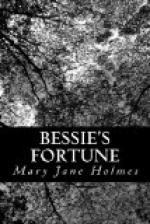Over four hundred invitations were given to the wedding, as Mrs. Browne said she “didn’t mean to make nobody mad.” But she did offend more people than if her party had been more select, for when Mrs. Peter Stokes, the truckman’s wife, heard that her next door neighbor, Mrs. Asa Noaks, the hackman’s wife, had received an invitation and she had not, her indignation knew no bounds, and she wondered who Miss Ike Browne thought she was, and if she had forgotten that she once went out to work like any other hired girl; and when Susan Slocum, whose mother took in washing, heard that her friend Lucy Smith, who worked in the mill, was invited and she was not, she persuaded her mother to roll up the four dozen pieces which had been sent from the Ridge to be washed, and return them with the message that if she wa’n’t good enough to go to the wedding she wa’n’t good enough to wash the weddin’ finery. This so disturbed poor Mrs. Browne, who really wished to please every body, that but for the interference of Allen and Augusta she would have gone immediately to the offended washerwoman with an apology, and an earliest request to be present at the wedding.
“Don’t for pity’s sake, ask any more of the scum,” Allen said, adding, that if she had not invited any of them no one would have been slighted.
“Well, I don’t know,” Mrs. Browne rejoined, with a sigh; “I can’t quite forget when I was scum myself, and knew how it felt.”
On the whole, however, everything went smoothly, and the grand affair came off one November night when the air was as soft and balmy as in early summer, and the full moon was sailing through a cloudless sky as carriage after carriage made its way to the brilliantly lighted house through the dense crowd of curious people which filled the road in front, and even stretched to the left along the garden fence. All the factory hands were there, and all the boys in town, with most of the young girls, and many of the women whose rank in life was in what Allen called the scum, forgetting that but for his father’s money he might have been there too.
There were four bridemaids in all, and their dresses and trains were something wonderful to behold, as they swept down the stairs and through the long drawing-room to the bay-window where, amid a wilderness of roses, and azalias, and lilies, they were to stand. This was the part the most distasteful to Lord Hardy, who would greatly have preferred being married in church according to the English form—and, in fact, Augusta would have liked that, too; but Mrs. Browne was a stanch Baptist, and opposed any deviation from the good old rule, and so Lord Hardy was compelled to submit, though his face wore the look of anything but a happy man as he went through the ordeal which made him Augusta’s husband, and then received the congratulations of the guests, most of whom addressed the bride as Lady Hardy.
When Augusta heard of Bessie’s engagement with Grey she went at once to congratulate her, and insisted upon her being one of her bridemaids. But Bessie declined; she was too much a stranger to take so conspicuous a place, she said, and would rather be a quiet looker-on.




